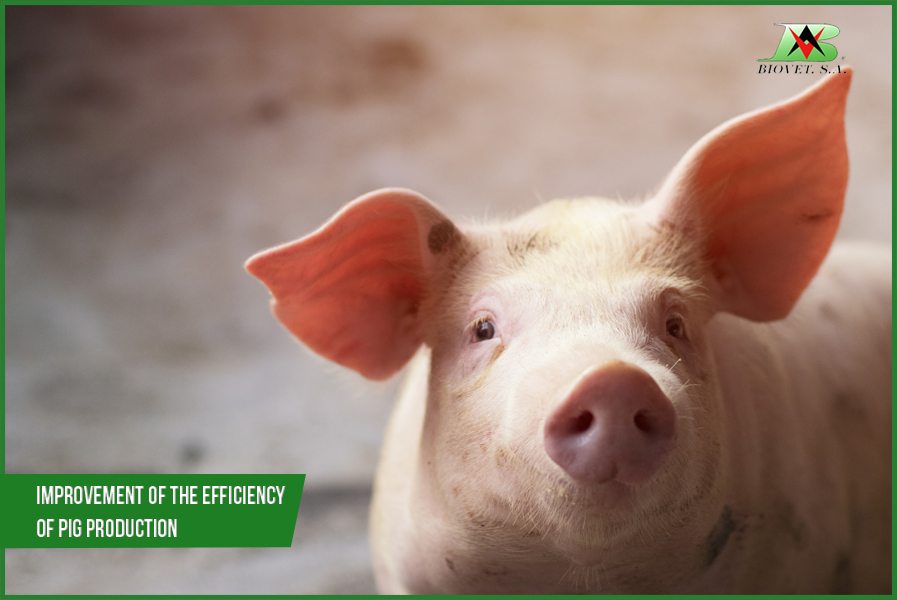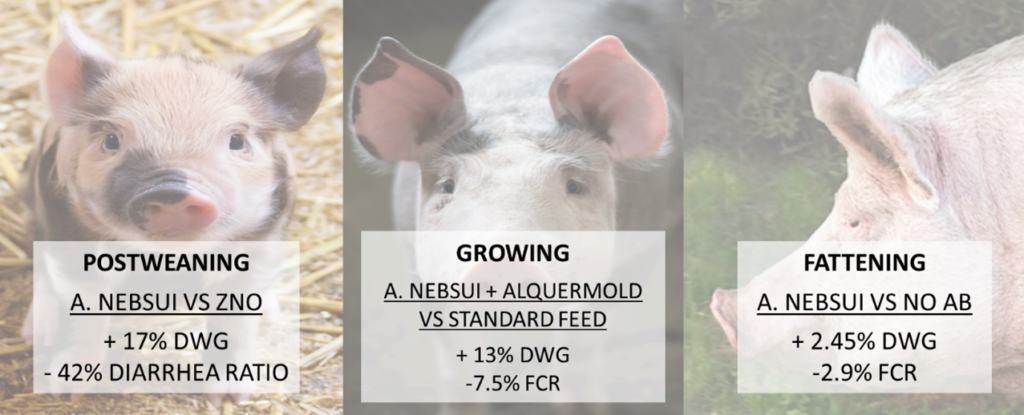Improvement of the efficiency of pig production with intestinal conditioner pronutrients

Meat demand is expected to increase worldwide because of population and economic growth. As the demand of animal product increases, pork will remain as one of the main protein sources.
Currently, the pig industry is facing a period of transformation where the improvement of production yields is basic for the sustainability of the farms and the food supply chain.
Two of the main problems that the pig industry faces are:
-
- Diarrhea incidence, as changes in the diet and stressful situations, like the weaning period, may favour the intestinal disbalance.
- Feed costs. Since feed rate represents the major cost of the total production cost, feed efficiency has an enormous impact on profitability of producers.
New strategies in feeding are needed to improve these problems and thus, the efficiency of the pig production.
Diarrhea in pig production
Diarrhea outbreaks in pig production are commonly found in lactating and weaned piglets, reducing the weight gain and leading, often, to mortality. The cost of the therapeutic treatment should be added to the economic impact of this disorder.
Weaning is a stressful moment for the piglet that causes temporary feed rejection and has a negative impact on development and functionality of the intestine. Many studies have shown the positive effect of a high feed intake during nursery in the reduction of intestinal disorders and the performance in later stages.
Furthermore, there are stressful situations, like diet changes and movement of the animals between facilities (especially at every stage of the cycle: farrowing, transition, growing and finishing) that make animals prone to suffer intestinal disbalances and more susceptible to digestive pathogens and infections.
The development of diarrhea at the mentioned critical points causes serious economic losses in pig herds.
Feed costs
Considering that feed cost represents around 70% of the total cost of commercial pig production, feed efficiency has a huge impact on profitability of the farms. Therefore, the nutritional program and feed use per stage should be continuously reviewed.
Special importance should be paid at grower and finisher stages, accounting for two-thirds of the total feed costs. As the animal grows, it also does the feed consumption, and that is why lactation and nursery stages only mean a third of the feed costs. Thus, improvement of feed efficiency at later stages will have a higher impact on the economy of the farm.
There are many factors to be considered to improve feed efficiency. This article will review the impact of one of them, which is the use of natural feed additives, key to improve performance and economic results of the farm.
Pronutrients: Intestinal welfare and efficiency in pig production
The improvement of the performance and efficiency of a pig farm is linked to a good health and nutrition management.
The best strategy to control diarrhea outbreaks is to implement a prevention plan. Diet changes should be specially considered, and a gradual transition between feeds should be done to ease their acceptance and digestibility. In the past, prophylaxis was usually done with antibiotics and/or zinc oxide. However, both regulations and bacterial resistance discourage the use of them.
Among the natural solutions available, Alquernat Nebsui, based on intestinal conditioner pronutrients, stand out as an effective tool to enhance the integrity and welfare of the gut in swine.
Intestinal conditioner pronutrients are active molecules from plant origin that stimulate the expression of certain genes (CD1E, RIMBP2, among others) in the enterocytes, related to different functions: defensive ones, such as cell adhesion (reinforcement of tight junctions) and proliferation (mucosa regeneration) and related to the absorption and metabolism of nutrients.
The enhanced gene expression and subsequent higher synthesis of functional proteins caused by intestinal conditioner pronutrients has demonstrated to reduce the risk of diarrhea, and also to increase feed utilisation, leading to a better efficiency and performance of pigs.
Efectivity corroborated in in vitro an in vivo trials
Thus, the effectivity of Alquernat Nebsui is corroborated by multiple in vitro and in vivo trials in universities and research centres worldwide, as well as in commercial farms.
During postweaning period, Alquernat Nebsui proved to be a safe bet to replace zinc oxide, as it achieved a reduction of 42% in the diarrhea ratio, while daily weight gain (DWG) was increased by 17% compared to zinc oxide group.
Trials in grower and finisher stages aimed to reduce the feed needed to reach the target weight and succeeded. As per shown in picture 1 below, during the growing period, the combination of two Biovet solutions allowed to reduce feed conversion ratio (FCR) by 7.5% compared to a standard feed, while FCR was improved by 3% in pigs using Alquernat Nebsui at the last 30 days of the cycle, compared to a feed without antibiotics.

Picture 1. Sum up of the performance results obtained in pig commercial farms with Alquernat Nebsui in the different stages: nursery, growing and fattening. DWG: daily weight gain; FCR: feed conversion ratio.
Alquernat Nebsui, natural solution to enhance gut welfare in pig production
Digestive disorders and feed costs are two of the main problems in the pig industry. Nowadays, the swine sector is facing a period where the improvement of the performance is basic for the profitability of the farm.
Natural solutions, like Alquernat Nebsui, based on intestinal conditioner pronutrients, are the best choice to enhance gut welfare, reduce the negative impact of diarrhea and enhance nutrients’ utilisation, which would ultimately lead to an improved feed conversion rate (FCR) and farmers’ ROI (Return of Investment).
Multiple commercial trials allow to demonstrate the effectivity of Alquernat Nebsui in pigs through different production stages and conditions, as well as its positive effect in the function of the intestinal epithelium, that allows to reduce the diarrhea incidence by 43% in nursery and improve the FCR by 3% in the fattening pigs.
Alquernat Nebsui is a unique technology that has been researched, described and patented by the R&D department of Biovet and is available in powder and liquid presentation.
BIBLIOGRAPHY
Borrell, J. (2005). Uso de pronutrientes de origen natural en veterinaria. RACVE (Real Academia de Ciencias Veterinarias de Esp.
Borrell, J., Domenech, C., Martin, N., & Tesouro, A. (2016). Pronutrients use in poultry nutrition (S11-0224). Conference at XXV World’s Poultry Congress (p. 97). Beijing, China.
VanderWaal, K., & Deen, J. (2018). Global trends in infectious diseases of swine. Proceedings of the National Academy of Sciences of the United States of America, 115(45), 11495–11500. https://doi.org/10.1073/pnas.1806068115.
Wills, R. W. (2000). Diarrhea in growing-finishing swine. The Veterinary Clinics of North America. Food Animal Practice, 16(1), 135–161. https://doi.org/10.1016/S0749-0720(15)30140-7.
